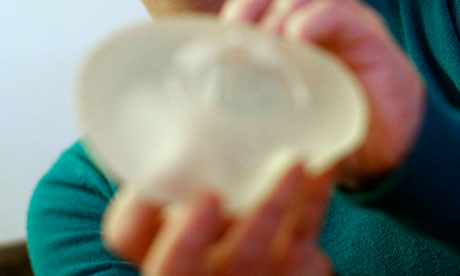
The British government has insisted breast implants made from a substandard silicone gel present no increased risk of rupture or cancer to women despite French advice that they should be removed.
The French health minister, Xavier Bertrand, said on Friday that 30,000 French women who had silicone implants manufactured by Poly Implant Prothèse (PIP), should have them removed, adding that the government would meet the cost. Last week his government disclosed eight cases of cancer among women with PIP implants.
The firm, based in southern France, was closed last year after it was found to be using cheaper, industrial-grade silicone intended for use in electronics, mattresses or agriculture and not approved for medical use.
Dame Sally Davies, the chief medical officer for England, insisted the estimated 40,000 British women with PIP implants "should not be unduly worried". She said: "We have no evidence of a link to cancer or an increased risk of rupture. While we respect the French decision, no other country is taking similar steps. Because of this, and because removing these implants carries risk in itself, we are not advising routine removal."
She said women with concerns should speak to their surgeon. She is writing to all GPs "so they are aware of the concerns".
The UK regulator, the Medicines and Healthcare Products Regulatory Agency (MHRA), has insisted there is no evidence of a cancer link and no need for women to have the implants removed.
Davies said the agency was in contact with the French regulatory agency while the health secretary, Andrew Lansley, had been liaising with his counterpart. "Our experts will examine any further evidence from France and across the world."
The British Association of Plastic, Reconstructive and Aesthetic Surgeons said in a statement that it was reassured that no evidence had been found of increased cancer risk. "However, we are concerned that the French authorities believe that the slightly increased chance of rupture and potential risk of irritation from the silicone gel is a reason for removal of the implants, regardless of their state of deterioration."
It said women with implants were not at immediate risk but, like Davies, said they should contact their surgeon if concerned.
The French announcement comes after months of controversy over the implants, and will cost the government an estimated €60m (£50m). Previously, the health ministry had said that only women with leaking or burst implants should have them removed.
Bertrand said in a statement that women with PIP implants did not have a higher risk of cancer than women with implants manufactured by other firms. But he warned of "well-established risks of ruptures" in the faulty PIP implants.
The French junior secretary for health, Nora Berra, warned of the known risk of ruptures saying the "irritant" gel could lead to inflammation.
It emerged this week that more than 270 women in the UK are attempting to sue clinics where they underwent surgery to be fitted with PIP implants.
A court hearing in Cardiff next month will see lawyers apply for a group litigation order, so that a class action could be launched against at least six clinics.
Mark Harvey, a partner at Hugh James solicitors which is representing more than 250 women, said some clients complained of inflammation, fatigue and fibromyalgia, a musculoskeletal pain disorder.
He said the British government should order clinics to remove and replace the implants at their own expense, rather than obliging the taxpayer or the women to meet the bill.
"A number of the clinics went into liquidation when this blew up so in that respect the government will have to step in, but the reality is there's still a large number of clinics out there that are still trading and they're saying if you want the implants removed and replaced you'll have to pay for them all over again."
Another 27 complainants have lodged a group action with the high court against 13 separate clinics where they had augmentation surgery.
PIP was once one of the world's largest producers of silicone implants, making around 100,000 a year of which 80% were exported. Its biggest market was Latin America, where Argentina, Brazil, Colombia and Venezuela were key markets.
Ramón Zapata, head of Venezuela's plastic surgery association, issued a "call for calm" and in an interview with El Universal Zapata insisted the implants did not represent a public health risk.

